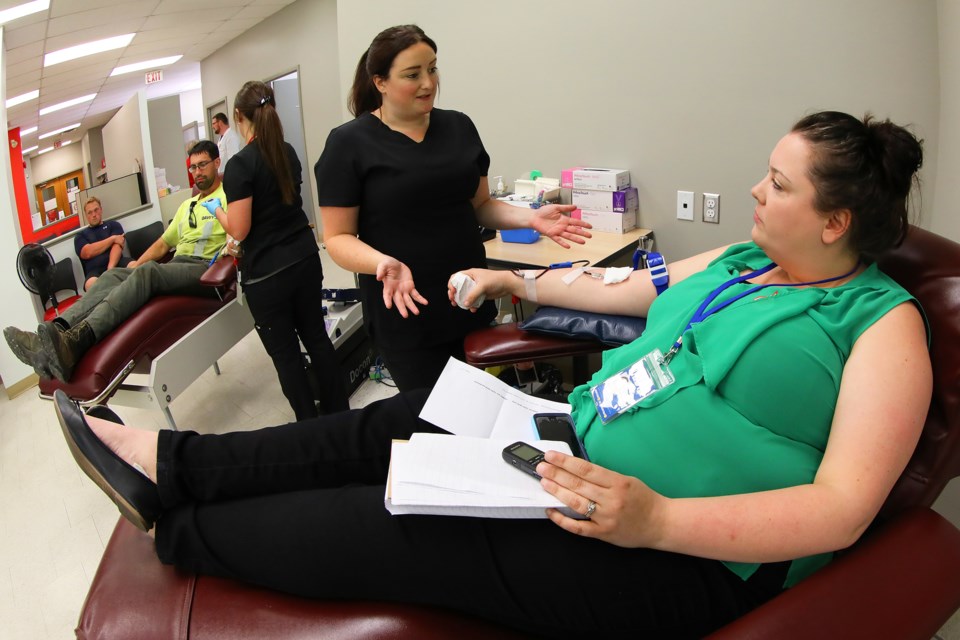As a horror fan, I usually love seeing blood splashed across a TV screen from the comfort of my home. But in real life, I’ve been a wuss about blood donation.
Last month, while covering a blood-donor appreciation event, I let two pieces of critical information slip to organizer Elaine St. Pierre.
I have O-negative blood, and I have never donated before.
As the need is greatest for donors with O-negative blood due to being considered universal donors, St. Pierre nearly jumped out of her skin with excitement.
“You need to come see us!” she said excitedly.
When I spoke with St. Pierre, who is also the territory manager for the Barrie location of Canada Blood Services, she said demand is up, but supply is down due to regular donors going on vacations while accidents increase, especially on long weekends.
“The summer is challenging,” she said.
One in two Canadians are eligible to donate blood, yet only one in 60 actually does.
After mulling it over during the ceremony, I caught her afterwards and told her I would come see her in July to donate.
Her excitement was, frankly, contagious. She promised me pizza as a reward.
As my donation day approached, some of the concerns that had held me back from donating in the past rolled around in my head.
I have some friends who are gay and are in long-term relationships, and they are not allowed to donate unless they’ve been celibate for the past year. Back in the 1980s, men who have had sex with men were not allowed to donate at all. Although the rules have loosened up over the years, it still feels, to me, like it’s exclusionary.
All blood that’s taken is tested for HIV, HTLV, hepatitis C, hepatitis B, West Nile virus, syphilis, Chagas disease and Zika before it’s approved for donation, so why is this rule still in place?
I also absolutely hate needles.
I had to fill out a questionnaire and visit a nurse to who asked me health questions before starting.
One of the questions was whether I had come into contact with any monkeys over the past month.
I do some interesting things as part of my job but sadly, hanging out with monkeys hasn’t been one of them.
At least, not this month.
After getting set up and feeling the slight pinch of the needle, Amanda McNeil, a donor care associate with Canadian Blood Services, chatted with me during my donation.
“The O-negative is in very short supply. I believe we have two days on-hand,” said McNeil.
When I told McNeil that I'm O-negative, a sly smile spread across her face.
“We’re going to be calling you!” she said, in a sing-song voice.
McNeil advised that potential donors should drink lots of water starting three days or more prior to donating.
“More than your eight glasses a day,” she said.
McNeil says this is important because they are technically dehydrating you when they take your blood. She also emphasizes that it’s important to drink lots of fluids for 48 hours after donating, for the same reason.
When one person donates, their blood gets separated into platelets, plasma and red cells. Therefore, Canadian Blood Services says you save three lives with each donation.
I found that while I was giving blood and interviewing McNeil, I was having trouble maintaining focus.
I asked her if this was a normal side effect. She said it is, and that donors can regularly feel light-headed.
I should have written down questions to ask in advance.
Within six minutes and seven seconds, it was over. McNeil told me the average donation time was seven minutes, so my Type-A personality was pleased.
After getting disconnected, I made my way to the snack table to have some juice and talk with fellow donors.
Andrea Barnett had planned to give her 16th donation that day, but was unfortunately ineligible.
“The reason I started donating was because, back when I had my daughter, I had a blood transfusion,” said Barnett. “If it wasn’t for that donor, I may not be here.”
Derek Kent gave his 14th donation that day.
“It’s something that’s really easy to do,” said Kent. “I don’t do a lot of volunteering or anything, so at least it’s something (I can do) that doesn’t take up much of your time. It’s just an hour out of your day.”
Logan Cosgrove had the highest number of donations at the table, with 22.
“My parents donated, so I always came with them, and after I turned 18 I just kept doing it, just because,” he said. “I make time for it.”
Barnett’s son Sean said he’s afraid to donate because he hates needles.
Me too, my friend.
Although, it seems my fears were unfounded. The needle didn’t hurt as much as expected, and it was over before I even had a chance to settle in.
Also, St. Pierre was true to her word. The pizza was delicious.
The Barrie clinic is open Tuesday to Saturday weekly. For hours and more information on donating, click here.



